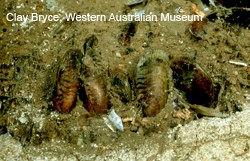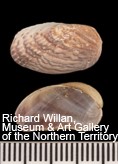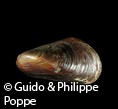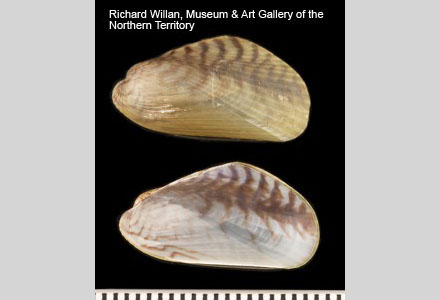Asian date or bag mussel (Musculista senhousia) grows quickly and can smother seabed life. It can affect the productivity of commercial fisheries and aquaculture.
What to look for
Features:
- brown or olive green colour
- dark zigzag lines on outer shell
- shiny radiating bands
- easy to crush between the fingers
- up to 3cm long.
Where to look
Look in or around:
- artificial surfaces
- mud
- rocky reefs
- sand.
Likely habitats include:
- shores and shallow waters, up to 20m deep.
Established pest in parts of Victoria, Tasmania, South Australia and Western Australia.
Similar native species
These native species look similar to Asian date or bag mussel. They do not need to be reported.
Cuming’s bag mussel (Musculus cumingianus)
Features:
- uniformly brown
- shell has ribs on front and back but not centre.
Habitat:
- inside sea squirts on rocky reefs.
Widespread in tropical and warm temperate Australia, such as Queensland, Western Australia, Northern Territory.
Limnoperna (formerly Xenostrobus) spp.
Features:
- colour ranges from blue to brown/black
- smooth, elongated shell with radial markings
- forms clusters
- up to 4cm long.
Habitat:
- attaches to rocks or shells on rocky reefs.
Known locations are southern Queensland, New South Wales, Victoria, Tasmania, South Australia, southern Western Australia.
Report it
See something unusual? Report it. Even if you’re not sure.
If you see something you think is a pest:
- note the exact location (screenshot your map app or enable photo geotagging on your phone)
- take a photo (use something for size reference, like a coin or note)
- contact your state or territory authority.
Stop the spread of marine pests
Start with these simple steps:
- Inspect and clean your boat or yacht. Make sure you check hard to reach areas.
- Treat the hull of your boat or yacht regularly.
- Clean and dry your fishing and diving gear after every use.
How you can stop the spread of marine pests.
Your location
The map shows known pests and pests to look for around Australia.





